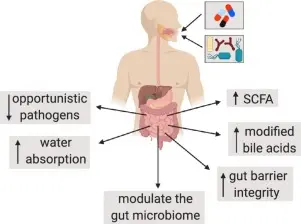Overview
Diagnosis of Antibiotic-Associated Diarrhea
Your healthcare professional will begin by asking about your symptoms and reviewing your recent diet, antibiotic use, and overall health history.
Stool testing
A sample of your stool may be sent to a laboratory to check for infections, including Clostridioides difficile (C. difficile), which can cause more severe antibiotic-associated diarrhea.
Treatment of Antibiotic-Associated Diarrhea
Treatment depends on the severity of symptoms and whether a C. difficile infection is present.
Mild diarrhea management
-
Most mild cases resolve within a few days during or after antibiotic use.
-
Your doctor may recommend switching to a different antibiotic if diarrhea persists.
-
Maintaining hydration is important to prevent complications from fluid loss.
Treatment for C. difficile infection
-
The original antibiotic may need to be stopped.
-
Your healthcare professional may prescribe specific antibiotics that target C. difficile bacteria.
-
Medications that lower stomach acid may be paused to support recovery.
Managing recurrent or severe infections
-
Recurring C. difficile infections may require additional treatments, such as fecal microbiota transplantation to restore healthy gut bacteria.
-
In severe cases, surgery may be necessary to remove damaged sections of the colon.
Advertisement

